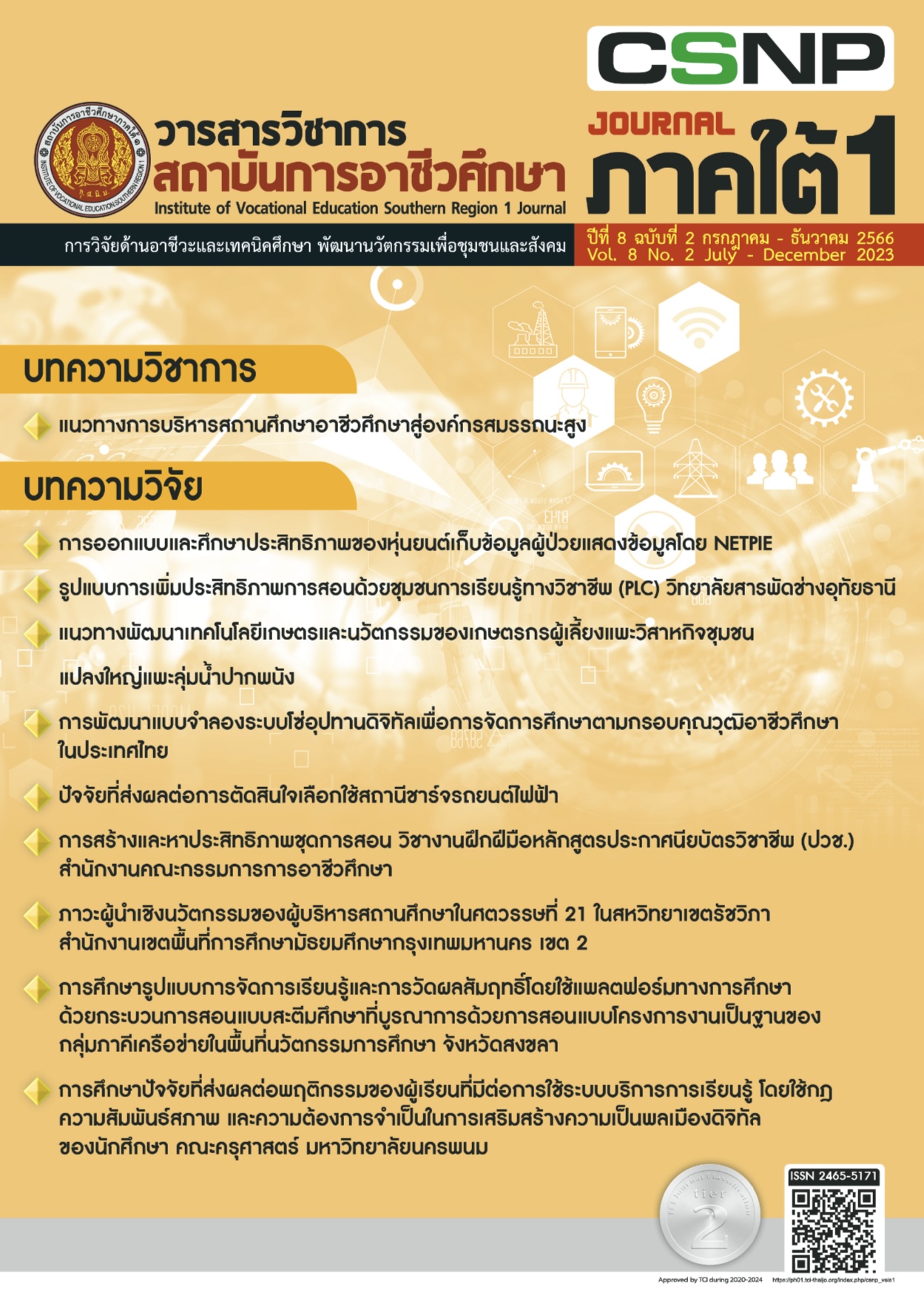ปัจจัยที่ส่งผลต่อการตัดสินใจเลือกใช้สถานีชาร์จรถยนต์ไฟฟ้า
คำสำคัญ:
รถยนต์ไฟฟ้า, สถานีชาร์จ, ส่วนประสมทางการตลาด 7Pบทคัดย่อ
การศึกษาในครั้งนี้มีวัตถุประสงค์เพื่อ 1) ศึกษาปัจจัยที่ส่งผลต่อการตัดสินใจเลือกใช้สถานีชาร์จรถยนต์ไฟฟ้า และ 2) สำรวจความคิดเห็นที่สามารถใช้เป็นแนวทางในการติดตั้งสถานีชาร์จรถยนต์ไฟฟ้า เป็นการวิจัยเชิงปริมาณโดยใช้แบบสอบถามเป็นเครื่องมือในการรวบรวมข้อมูลจากกลุ่มตัวอย่างซึ่งเป็นผู้ใช้รถยนต์ไฟฟ้าในประเทศไทยประเภท BEV และ PHEV จำนวนทั้งสิ้น 200 คน โดยวิธีการสุ่ม ทำการวิเคราะห์การแจกแจงความถี่ ร้อยละ ค่าเฉลี่ย ส่วนเบี่ยงเบนมาตรฐาน t-test One-way ANOVA และ Multiple Regression โดยผลการศึกษาพฤติกรรม พบว่า ส่วนใหญ่ชาร์จที่บ้าน 3-4 ครั้งต่อสัปดาห์ โดยมีระยะเวลาการชาร์จโดยเฉลี่ย 31-60 นาที ด้านปัจจัยส่วนประสมทางการตลาด 7P พบว่า ด้านกระบวนการเป็นปัจจัยในการตัดสินใจชาร์จมากที่สุด รองลงมาคือ ด้านช่องทางการจัดจำหน่าย และด้านสิ่งแวดล้อมทางกายภาพ ตามลำดับ
ผลการวิจัย พบว่า 1) เพศ อายุ อาชีพ รายได้เฉลี่ยต่อเดือน และจำนวนรถยนต์ มีผลต่อการตัดสินใจใช้สถานีชาร์จ ด้านช่องทางการชำระเงินที่มีความหลากหลาย และด้านความปลอดภัยทั้งบริเวณโดยรอบสถานีชาร์จ 2) ผลการทดสอบความสัมพันธ์ที่มีต่อการตัดสินใจใช้สถานีชาร์จรถยนต์ไฟฟ้า พบว่า ปัจจัยส่วนประสมทางการตลาด 7P ด้านผลิตภัณฑ์ ด้านราคา และด้านช่องทางการจัดจำหน่าย มีความสัมพันธ์กับการตัดสินใจเลือกใช้สถานีชาร์จรถยนต์ไฟฟ้า โดยสามารถทำนายการตัดสินใจเลือกใช้สถานีชาร์จรถยนต์ไฟฟ้าได้ร้อยละ 35.1
เอกสารอ้างอิง
Momoh, O. D., & Omoigui, M. O. (2009). An Overview of Hybrid Electric Vehicle Technology. In 2009 IEEE Vehicle Power and Propulsion Conference 20 October 2009, Dearborn, MI, USA
Daramy-Williams, E., Anable, J., & Grant-Muller, S. (2019). A Systematic Review of the Evidence on Plug-in Electric Vehicle User Experience. Transportation Research Part D: Transport and Environment, 71, 22-36.
ฝ่ายสื่อสารองค์กร บริษัท ปตท. จำกัด (มหาชน). (2561). [ออนไลน์]. รถยนต์ไฟฟ้าเปลี่ยนโลก. [สืบค้นเมื่อวันที่ 11 กันยายน 2565]. จาก https://pttinsight.com/api/upload/issues/PTTEV-resize(1).pdf.
Rahman, K., Jurkovic, S., Stancu, C., Morgante, J., & Savagian, P. (2012). Design and Performance of Electrical Propulsion System of Extended Range Electric Vehicle (EREV) Chevrolet Volt. IEEE Transactions on Industry Applications, 51(3), 4152-4159.
Andwari, A. M., Pesiridis, A., Rajoo, S., Martinez-Botas, R., & Esfahanian, V. (2017). A Review of Battery Electric Vehicle Technology and Readiness Levels. Renewable and Sustainable Energy Reviews, 78, 414-430.
Kotler, P. (1997). Marketing Management: Analysis, Planning, Implementation and Control (14th ed.). NJ: Prentice-Hall.
ชนินาถ สงวนวงศ์วิจิตร. (2552). วิธีดำเนินงานวิจัย. กรุงเทพมหานคร: มหาวิทยาลัยธรรมศาสตร์.
ผกาภรณ์ บุสบง. (2564). ปัจจัยที่มีผลต่อการตัดสินใจเลือกใช้สถานีบริการน้ำมัน ปตท. ของผู้ใช้บริการในจังหวัดพะเยา. วารสารปรัชญาปริทรรศน์, 26(1), 179-191.
จุฑาภรณ์ เหมือนชู และศุภลักษณ์ ฉินตระกาล. (2565). ปัจจัยทางการตลาดที่มีผลต่อการตัดสินใจเลือกบริโภคและใช้บริการร้านกาแฟสดคาเฟ่อเมซอนในสถานีบริการน้ำมัน ปตท. จังหวัดกาญจนบุรี. วารสารมหาจุฬานาครทรรศน์, 9(1), 303-316.
รักษ์สินธิ์ แสงรุจี. (2564). ปัจจัยที่ส่งผลต่อการเลือกใช้สถานีชาร์จรถยนต์ไฟฟ้าของผู้ใช้รถยนต์เครื่องสันดาปในประเทศไทยที่ต้องการเปลี่ยนไปใช้รถยนต์ไฟฟ้าในอนาคต. สารนิพนธ์ ปริญญาการจัดการมหาบัณฑิต วิทยาลัยการจัดการ มหาวิทยาลัยมหิดล, กรุงเทพมหานคร.
ดาวน์โหลด
เผยแพร่แล้ว
ฉบับ
ประเภทบทความ
สัญญาอนุญาต
ลิขสิทธิ์ (c) 2023 วารสารวิชาการสถาบันการอาชีวศึกษาภาคใต้ 1

อนุญาตภายใต้เงื่อนไข Creative Commons Attribution-NonCommercial-NoDerivatives 4.0 International License.



